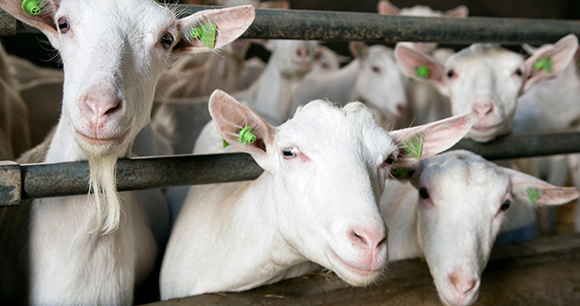
Washington, DC—The US Department of Agriculture consistently fails to review and respond to animal welfare violations at custom-exempt slaughter facilities, resulting in animals being beaten, held in deplorable conditions, and deprived of food and water for extended periods, according to a petition delivered to the USDA today on behalf of the Animal Welfare Institute (AWI).
The petition is based on a newly released AWI analysis covering two years of federal inspection records that were obtained under the Freedom of Information Act. It calls on the USDA’s Food Safety and Inspection Service (FSIS) to thoroughly revise its directive pertaining to custom-exempt slaughter to better protect animals, avoid misleading the public, report suspected animal cruelty to state authorities, and close loopholes that allow facilities suspended for egregious humane handling violations to continue slaughtering animals under their custom status, among other recommendations.
Custom-exempt plants serve hunters who want to process wild animal carcasses; they also slaughter cattle, pigs, sheep, and goats for anyone who wants meat for themselves, their household, or nonpaying guests. The “exempt” signifies that these operations are excused from continuous inspection, unlike facilities subject to state and federal inspection, where government officials are on the premises whenever slaughter is being conducted. In 2009, the FSIS instructed its personnel to apply the Humane Methods of Slaughter Act (HMSA) to custom-exempt slaughter facilities, which requires the humane treatment and handling of certain food animals at slaughter.
Despite that directive and two subsequent revisions, the AWI report concludes that the “FSIS does not apply the HMSA to custom-exempt slaughter in any meaningful way.”
At the same time, federal and state lawmakers have attempted to increase the number of custom-exempt slaughter establishments in response to consolidation in the meat industry. Passage of such legislation would in effect allow the retail sale of uninspected meat, creating food safety risks and increased potential for inhumane treatment of animals.
“AWI is unfortunately accustomed to uncovering and witnessing the most egregious forms of animal abuse; the treatment of custom slaughtered farm animals surely ranks among the worst,” said Dena Jones, AWI’s farm animal program director. “Moreover, while custom-exempt slaughterhouses are expected to follow federal food safety regulations, inspectors do not routinely observe that they comply with them.”
Among the report findings:
- Reviews of custom plants are not being conducted – The FSIS custom-exempt directive states that inspection personnel are to conduct reviews at custom-exempt establishments “generally at a frequency of once per year.” According to the FSIS, 285 federal custom-exempt establishments were operating in 2019–2020. However, only 27 (less than 10%) of those plants appear to have been reviewed in that year.
- Slaughter is not being observed at custom plants – Of the custom-exempt slaughter plants reviewed in 2019, FSIS inspectors documented observing the actual killing of animals at less than a third of them. Moreover, a significant number of reviews indicated the inspector was aware that slaughter would not even be conducted on the day of the visit.
- Federal plants use custom status to dodge violations – According to FSIS records, some plants that perform both federally inspected and custom-exempt slaughter are claiming that all animals on the premises are intended for custom slaughter until just before they are killed. Because inspectors lack the authority to take regulatory actions, such as halting slaughter, in response to a violation involving a custom animal, these plants may be avoiding legal consequences for inhumanely handling animals during unloading or while they are kept in holding pens for as long as several weeks.
- Plants suspended from federal slaughter are allowed to operate as custom – Because enforcement actions are not taken at custom-exempt plants, these establishments may continue to hold and slaughter animals even if federal inspection has been suspended or withdrawn for egregious humane handling incidents.
- Animal neglect and abuse is occurring at custom plants – Current FSIS policy allows for the gross mistreatment of animals destined for custom-exempt slaughter, because not beating and not starving animals are considered mere “recommendations.”
Marjorie Fishman, Animal Welfare Institute
[email protected], (202) 446-2128
The Animal Welfare Institute (awionline.org) is a nonprofit charitable organization founded in 1951 and dedicated to reducing animal suffering caused by people. AWI engages policymakers, scientists, industry, and the public to achieve better treatment of animals everywhere—in the laboratory, on the farm, in commerce, at home, and in the wild. Follow us on Facebook, Twitter, and Instagram for updates and other important animal protection news.